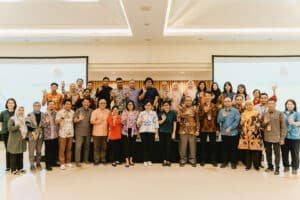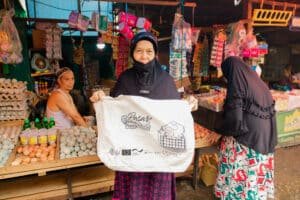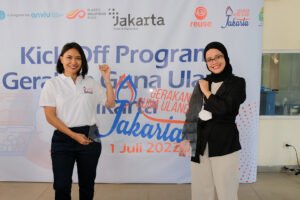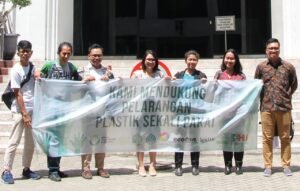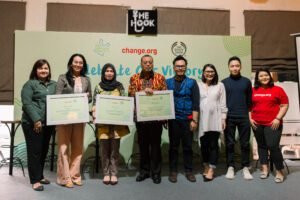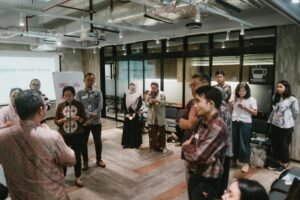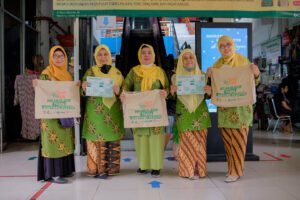Jakarta, 11 June, 2018 – In conjunction with the World Ocean Day and as part of the Clean Seas Campaign, for the first time, UN Environment awarded 5 remarkable persons from Indonesia, India, Thailand, United Kingdom, and the USA as the Ocean Heroes 2018. Facts and researches show that more than 8 million tonnes of plastics end up in the ocean every day. A recent study predicted that currently more than 150 million tonnes of plastics are found in the ocean. In a Business As Usual scenario, by 2050, there will be more plastics than wastes in the ocean.
Another study has revealed that almost all of the debris inside the fish guts from Indonesia consisted of plastics, meanwhile, in the fish guts from the USA, it has been confirmed that 20% of the samples contain plastic fibres.
Tiza Mafira (34), Ocean Hero 2018 from Indonesia, a lawyer and Director of Gerakan Diet Kantong Plastik Indonesia (GIDKP), has been campaigning against the single-use plastic bags since 2013. She encourages the ban or the levy for disposable plastic bags in the retail sector. Tiza’s organization launched a petition in 2015 calling for retailers to no longer provide plastic bags for free. The following year, a national trial of paid plastic bags was introduced. After six months of trial, there was a significant reduction in the use of plastic bags in the country (55%). Although these trials were stopped due to inconclusive agreement among the stakeholders, several provinces have prepared their own initiatives to develop the relevant regulations and two cities in Indonesia have banned plastic bags in modern retail stores.
“I am grateful to the United Nations Environment who has given this appreciation to the efforts we have made so far. It was unexpected and a pleasant surprise because UN Environment appreciates our struggle to reduce pollution in the Indonesian ocean,” said Tiza Mafira. “I dedicate this award to my colleagues at GIDKP, Local Governments, and Ministries who have been working with us to encourage paid disposable plastic bags or ban it.”
The solution to the problem of plastic pollution is actually quite clear and Tiza is optimistic that big cities in Indonesia are able to make the right and wise decisions to overcome plastic pollutions. Evidently, after a period of paid plastic bag trials, some cities continue the policy with their own initiatives. One of them is Banjarmasin City, which shows commitment by halting the circulation of plastic bags in all retail stores. Furthermore, the city of Balikpapan has also followed by issuing a plastic bag termination regulation in all retail stores effectively by July 2018.
With an active encouragement from GIDKP and support from the Ministry of Environment and Forestry and Kota Banjarmasin, in February, 24 regencies have expressed their commitments to formulate their plastic waste reduction strategy. This step is taken to formulate a concrete strategy of reducing plastic bag waste in public spaces, including at seas.
“We are proud of Indonesia’s young people like Tiza awarded by the UN Environment as one of the 2018 Ocean Heroes. Pollution in the ocean and the vast ocean of Indonesia needs champions and leaders, especially from youth groups like Tiza and friends,” said Brahmantya S Poerwadi, Director General of Marine Spatial Management, Ministry of Marine Affairs and Fisheries.
“Efforts to control and reduce plastic pollutions from single-use plastic bags and other plastic wastes on land, especially in coastal and river cities, play an important role in reducing plastic pollution in our oceans and seas. We hope this prestigious award to Tiza can inspire more parties and to solicit more support to achieve Indonesia’s goal to have plastic-free ocean by 2025.”
Novrizal Tahar, Director of Waste, Ministry of Environment and Forestry, expressed similar notion.
“Tiza is a young Indonesian who has an idealism and consistent with her vision. The phenomenal idea that Tiza encourages us with her friends was when they built a movement and call for “no free-of-charge plastic bags” in 2016,” said Dr. Novrizal Tahar, Director of Waste Management, KLHK, expressed his appreciation. “The issue of ‘disposable shopping bags’ is not easy, because it received many challenges from various parties whom their comfort status quo felt disturbed. However, actually we have already had sets of adequate regulations that need to be implemented at the local level with improved and adequate supervisions.”
At the time the idea of ”plastic bags are not free” was launched, almost all of the nation’s top print media put the issues and news on headlines and home pages. According to Novrizal, only that time there is such intensive media attention to the issue of disposable plastic bags.
“Government needs to be more bold and firm in regulating disposable plastic bags. Permanent regulations for disposal and disposable plastic restrictions need to be accelerated soon because it’s been pending for too long,” said Nur Hidayati, WALHI’s National Executive Director. “The trials ran well and Tiza’s campaign need to proceed supported by a permanent regulation. More broadly, the prohibition and restriction of other disposable plastic packaging also needs to be done within the framework of Zero Waste Cities.”
“Plastic pollution in waters and oceans is increasingly critical and needs real action immediately. Lead by the examples of Tiza’s hard work and GIDKP in collaboration with Kota Banjarmasin and 24 other cities, we urge coastal and river districts to commit further,” said Yuyun Ismawati, BaliFokus Senior Advisor and AZWI (Alliance Zero Waste Indonesia).
“Urgently, we expect bold commitment from 40 cities this year to ban and eliminate the big 5: single-use plastic bags, plastic straws, styrofoam, small sachet packaging and microbeads in cosmetics. Coastal and river cities can control plastic pollution and better waste management in rivers and coastal areas as part of the Regional Strategic Policy (Jakstrada).”


